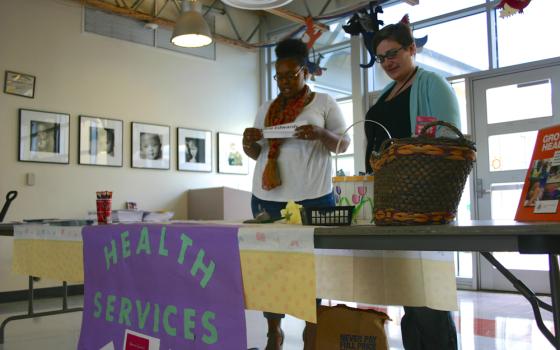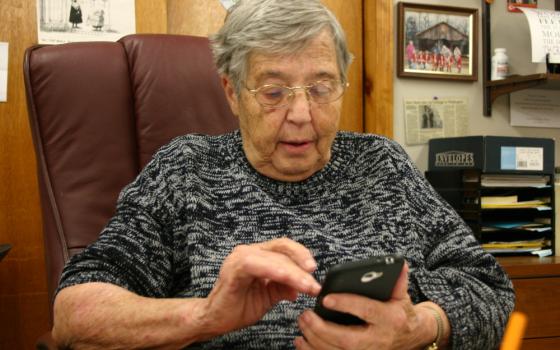Every week when the weather is nice, Sr. Berta Sailer climbs aboard a yellow school bus.
At 77, her legs don’t work as well as they used to – she’s had a long battle with back problems – so her steps up the narrow flight of stairs are slow and careful. But there is little else about Sailer that is in any way hesitant.
Her mission has become legendary in her adopted hometown of Kansas City, Mo. And it’s the reason she climbs aboard a school bus every week to take society’s "haves" on a tour to meet some of its most desperate "have-nots."
For more than four decades Sailer has been working with Kansas City’s poorest families through Operation Breakthrough, the daycare she founded in 1969 with Sr. Corita Bussanmas.
Sailer believes passionately that a broken system of laws and regulations are trapping people in poverty. Her mission is to change that system – or at least make sure people know why it’s broken.
“Economically, we never meet each other,” she says into a crackly microphone as the bus grinds forward. “I stopped at a very rich high school one day – they were senior boys – and I said, ‘How come people are poor?’ This kid says, ‘Cause they’re lazy and they make bad choices.’ ”
Sailer shakes her head as she recounts the tale for the group of employees from Children’s Mercy Hospital taking the tour this grey afternoon.
“You know what? If we can say [that], then just stop being lazy and stop making bad choices and you’ll be fine . . . . But that’s not true! The system is designed to keep people in poverty.”
As the bus rolls forward into some of Kansas City’s most downtrodden neighborhoods, so does Sailer’s case for changing the system.
“These are good moms,” she says again and again. “And they try hard.”
History of helping
For Sailer, this mission is nothing new. Her grandmother raised her in Chicago after her parents died in a car accident, and she has spent her adult life seeming to make each step a deliberate effort to help those most in need.
It’s just who she is and what she’s always done. But she’s not sure why she became a nun.
“I have no clue,” she said, one afternoon sitting behind the paper-strewn desk in her basement office at Operation Breakthrough. “What makes you decide something at 18?”
But Sailer’s life, said Susie Roling, a social worker and family advocate at Operation Breakthrough, is a living example of the gospel. She never rests and she never says she can’t help.
Sailer’s office sees a constant stream of people in need. Their problems run the gamut from homelessness to domestic abuse.
Her assistant, Christine Minkler, said, “She never asks them, ‘What’s your zip code?’ or ‘Do you have children here?’ or ‘Do I know you?’" She told me, "I have to keep people you and I would consider 'important' waiting because there is a mom in crisis and she would not rush that person.’’
How they got here
That’s the way it’s always been since Sailer and Bussanmas took it upon themselves to open a daycare in their convent for poor moms.
The sisters met in 1958 when their community – Sisters of Charity of the Blessed Virgin Mary – sent them to Chicago to help in the aftermath of the fire that destroyed Our Lady of Angels school, killing three nuns and 92 children.
When the sisters came to Kansas City – Bussanmas in 1967 and Sailer a year later – they were assigned to St. Vincent’s, an urban school that was in the heart of the city caught up in racial unrest. Bussanmas was the principal and Sailer taught seventh and eighth graders. But, as they had in Chicago, they soon saw a need beyond their official calling.
“In those days, middle and upper class women stayed home with the children and dads went to work,” said Bussanmas, who retired from Operation Breakthrough last year, but still shares a house and family with Sailer. “Only poor people needed childcare.”
The sisters found supplies at suburban garage sales. Kids came early. Sailer and Bussanmas would let them in (usually while still in pajamas), and two women from the parish would watch the kids while the sisters were at school.
The system worked well until the diocese decided to close St. Vincent’s. The diocese was focused on declining enrollment, but the sisters saw the families who would be left behind.
So Sailer and Bussanmas famously said “no” and told the bishop they’d continue themselves.
With only a couple hundred dollars in the bank, they were on their own.
In a lot of people’s eyes, their decision crossed a line, said Sr. Elizabeth Seaman, who spent 15 years working at Operation Breakthrough before she retired two years ago.
She asked, "The issue really is, when do you look at the parameters of an institution and when do you say, ‘No matter what, we’re going to cross those lines because we see a need on the other side?' I think that’s what they’ve done.”
Anything to help
By 1971, Operation Breakthrough was serving more than 500 kids, but it had few resources. Along with a small staff, the sisters cooked, drove the bus, taught the kids, counseled parents and always scrambled for any financial resources that would keep them going.
At one point, two parishioners who had helped them at the daycare when it first opened mortgaged their homes to pay the center’s delinquent payroll taxes. And there were times bills went unpaid and times employees, who were making little money anyway, were told to hold off cashing paychecks.
At one point, the nuns bought a gas station near the school. Sailer remembers going from bank to bank trying to get the loan. The lenders kept saying no, they’d get robbed.
“At the last bank I said, ‘Who’s going to rob a gas station run by nuns for poor kids?’”
Sailer got the loan, but before long, the station did get robbed – regularly.
“We’d call down there, get no answer and say, ‘We better go let them out of the bathroom’ – because they’d always lock them in the bathroom,“ Sailer said.
Operation Breakthrough long ago moved from the old St. Vincent’s facilities. Eventually they landed in a vacant JCPenney store in the urban core. The father of one of the center’s early teachers gave them the $30,000 they needed for the down payment. And year after year the sisters managed to keep the doors open.
Back then, kids had food to eat. And they had a home to go to at night. It was nothing like it is now, when 100 of the center’s 360 kids are homeless and others are in foster care.
Opened their home
When the sisters couldn’t figure out how to help enough just by taking care of children during the day, they opened their home. Over the years, they officially fostered 75 children. They adopted four.
The first one, whose drug-addicted mother was found murdered behind a downtown department store, couldn’t see or hear. As a baby, Kenyauta couldn’t even hold her head up. Today, at 20, she is developmentally 18 months.
Sailer and Bussanmas were in their 50s when they decided to adopt Kenyauta. But at the court hearing the judge wasn’t concerned about their age. He just wanted to be sure they weren’t gay.
They hadn't planned to adopt any of their foster children, Sailer said. But the reality was that Kenyauta didn’t have anybody else.
Sailer and Bussanmas adopted three more children. Ronnie, 19, was 3 months old when he came to them with terrible asthma and severely crossed eyes. He recently transferred from a college out of town to one nearby so he can help Bussanmas, who has medical issues that prevent her from working.
Tyrez, 14, and VanShay, 13, are brother and sister who came to the nuns as babies because their mother couldn’t care for them. They both attend a parochial school near home and have the air of average teenagers with homework to worry about and sports practices to get to.
The sisters’ small ranch home in Raytown, Mo., a working-class suburb of Kansas City, is chock-full. In addition to their four kids, the house is home to two’ grown foster sons – Chris and Myles, and – during the week – Chris’ 3-year-old daughter. On school holidays Cardell, 19, another foster son who is studying engineering, comes back to the house, too.
Sailer has made plans for what will happen to her four adopted kids when she is gone. But Roling wonders and worries about all the others.
“Even the team of supporters doesn’t have the capacity to support all of them,” she said. “It’s too much.”
Sailer is well aware of her responsibilities. Asked how long she can continue working so hard for so many people, a flash of exhaustion crosses her face.
“Corita and I are not good long-range planners, and when we adopted children one of the things we didn’t think about was you can’t raise kids on Social Security,” Sailer said. “We have to take care of our kids. I want to make sure they finish school. I’ll work as long as I can to provide for our kids, and I don’t know, we’ll see what happens. So far I’ve been pretty lucky.”
From the start, Sailer and Bussanmas wanted to give their kids a normal life. And in some ways they’ve succeeded in keeping them out of the fray of the kind of tragedy they see at Operation Breakthrough.
In fact, at times they are blissfully unaware. One day last year VanShay asked why their family didn’t do any volunteer work.
“She was very unhappy with us,” Sailer laughed.
A lifetime of service
In fact, VanShay’s mothers are nationally known for their service. Hillary Clinton has visited the center. Michelle Obama has invited the family to the White House. And Sailer has been a guest at the State of the Union address.
In Jefferson City, Mo., the state’s capital, Sailer has become the voice for the impoverished.
“A lot of us kind of consider her to be a living saint – someone who tells the truth in love and lets the chips fall where they may,” said Jeanette Mott-Oxford, executive director of the Missouri Association for Social Welfare and a former state representative.
Over the years Sailer and Bussanmas have singlehandedly helped thousands of poor families, and they’ve inspired hundreds – if not thousands – of volunteers to follow their lead. The center has many programs designed to get people to cross economic boundaries and lend a hand.
One, added recently, came out of a bus tour. After Sailer remarked that it would be great if the city could come up with 100 jobs for 100 women, Janie Gaunce, a business owner who happened to be on the tour, said she’d hire two women. She did and that began “100 Jobs for 100 Moms.”
In Jefferson City, State Senator Jolie Justus said Sailer’s persistence is well known and directly responsible for incremental improvements in Missouri’s childcare assistance laws.
“She gets legislators and city councilors and business folks to go on these tours and gets them talking about people and the policies that we enact or fail to enact in Jefferson City,” Justus said.
The next chapter
In the old days, Sailer, who has been called “the personality” of Operation Breakthrough, could bellow over the wall of her basement office to consult with Bussanmas.
While Sailer often bellows and always worries, Bussanmas was always the quiet force in the background that kept things running.
“I hate to say this, but I’m not a planner,” Bussanmas said, sitting in a recliner in the nuns’ living room, one big dog in the chair with her and a second at her feet. “What happens, happens. I’ll make the best of it. Worry? No. Oh my God, I don’t have a worry bone in me.”
Sailer can’t argue. “I’d say to her, ‘Corita, I worried all night about payroll.’ This was years ago. And she’d say, ‘Well, did you get any money?’"
They both laugh as they often do. Through all the worrying and all the tough times, they’ve always been able to laugh.
Today, Operation Breakthrough is serving its third generation of children. Thirty-five of its former kids are now in college. The once seat-of-the-pants daycare has a professional CEO and a $7 million budget. Inside its walls are health and dental clinics for children, a periodic health clinic for adults, a food pantry, mental health services, GED classes and a staff of social workers to support families.
The change really started in 2006 when the board launched a $9 million capital campaign. The result was a beautiful new early childhood center, but Jennifer Heinemann, Operation Breakthrough’s director of development, remembers what the consultant told employees at the time.
“She said, ‘I just want you to know, this is a great improvement, but things will never be the same.’"
In fact, she was right. The new building meant a huge increase in staff. But a rough economy in 2012 also meant some of the old timers – moms who were hired 20-plus years ago – had to be let go.
“It was all these people we had invested so much time and energy in giving them jobs,” Seaman said.
But more kids, more services, more federal and grant dollars and more donors all meant that change was really unavoidable.
“The center long ago got far bigger than Sister Berta and Sister Corita,” said Elisa Silverstein, a pediatric emergency room doctor who served on the board during the transition to an outside CEO.
Everyone understood that giving up control would be difficult for Sailer, but they also believed that for the center to survive, leadership and a structure for the future had to be established.
Changing the system
The good news for Sailer has been that the changes have freed her to have more time to spread her mission.
“If middle and upper class men and women in this city took a stand against women and children living in poverty – like they have against breast cancer and drunk driving – it would be gone,” Sailer tells the bus tour. “It’s here because we allow it.”
Hunger and homelessness are epidemic. But they’re just a piece of the puzzle. Drugs, prostitution, violence, human trafficking and discrimination are all in a day’s work for Sailer.
“These woman are so resourceful,” she says. “They try so hard. Do they make mistakes? Bad choices? Do I? Yes. That’s part of being human.”
Sailer wants people to know that most of the people she works with at Operation Breakthrough want to work. They aren’t lazy, as the stereotype goes. But with every step forward, the system sends them more steps backward.
When they work hard and get a job or a raise, they lose benefits like food stamps, health care and childcare assistance, for example, and are left without enough to live on.
When they scrape together enough money to buy a car, but can’t afford the repairs it needs to pass inspection, they end up bogged down in traffic fines and court fees.
Or when they make it through drug treatment and come out clean, they can’t get food stamps and are sent out to fend for themselves – probably back to the places where they turned to drugs in the first place.
“One of the things Sister Berta said to me in the very beginning was, ‘If you don’t go to bed pissed off, your eyes aren’t open,’" said Roling.
That’s why Sailer says that for as long as she still can, she’ll give these bus tours and talk to church groups and schools, and make the two-and-a-half hour drive to lobby legislators in Jefferson City.
“The whole system is just broken,” she often says. “People need to know what’s going on.”
[Suzanne King is a freelance journalist based in Kansas City, Mo.]





